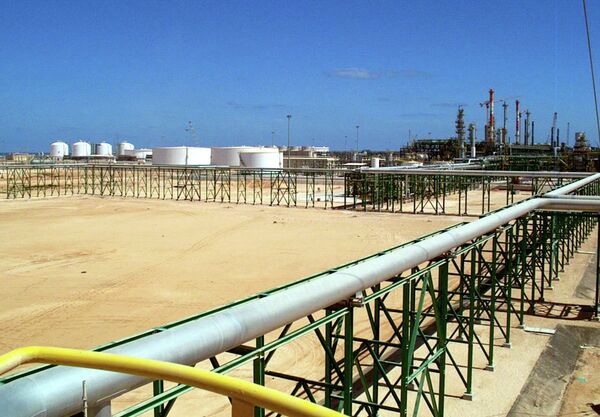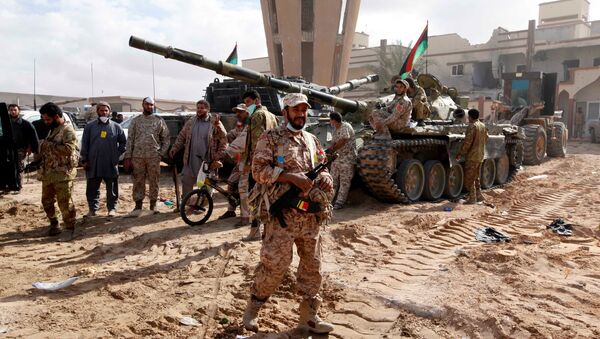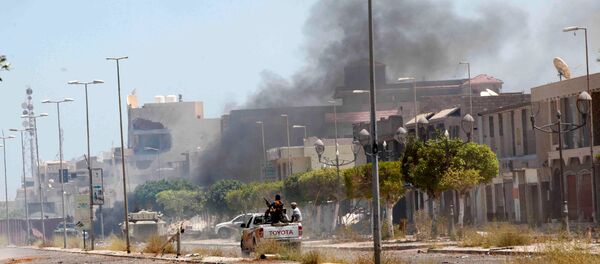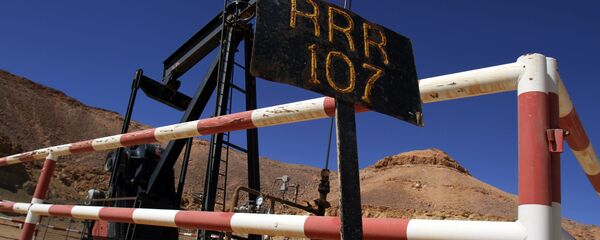"Our forces have total control of Sirte," Reda Issa, a spokesperson for pro-government forces, told AFP. Earlier on Monday the final few dozen Daesh insurgents, left in the Ghiza Bahriya district, surrendered to the Libyan forces, officials said.
It is likely that the extirpation of Daesh from the city will throw into stark relief the tensions between the UN-backed Government of National Accord (GNA) and the opposition government based in the country's eastern city of Tobruk, supported by Field Marshal Khalifa Haftar and his Libyan National Army (LNA).
Both sides have been grappling for political credibility since the 2011 ouster of Libyan strongman colonel Muammar Gaddafi.
Forces loyal to Haftar and the GNA have been locked in hostilities with Daesh over Sirte for approximately six months. Analysts have argued that both parties see capturing Sirte and defeating Daesh as an avenue to increasing credibility and legitimacy in the eyes of Libyans.
The international community has called upon Haftar and his forces — the Libyan National Army — to accept the authority vested in the GNA by the benediction of the UN. However, the characteristic vicissitude of post-Gaddafi Libyan politics has recently brought an unexpected twist of fate for the country's political trajectory.
Haftar and the LNA launched a military operation named 'Sudden Lightning' which sought to take control of Libya's oil crescent ports on the country's coast from the Petroleum Guard Forces (PGF). The PGF has acted as custodian to the oil ports for the GNA, which has earned them the contempt of Haftar and the opposition government in Tobruk, who have argued that oil — which is Libya's most lucrative export commodity — should be controlled by all parties, not only the GNA.
Libya boasts Africa's largest oil reserves, estimated at 48 billion barrels. Back in 2010 before the revolution and NATO bombing, Libya was producing approximately 1.65 million barrels per day. However, the post-Gaddafi security fallout and crisis has caused production rates to drop from 1.6 million barrels per day to under 260,000. The Libyan National Oil Company has estimated that costs of losses in production since 2014 have been approximately US$100 billion dollars.

Following the LNA's successful takeover of the oil crescent (which includes the ports Ras Lanuf, Sidra, Zueitina and Brega), Haftar declared the opening up of the ports for business, and announced he would be handing over control of the ports to the Libyan National Oil Company (NOC) to begin the process of exportation.
The GNA came out in condemnation of Haftar's takeover of the ports and initially the USA, Britain, Italy, Spain and France released a joint statement that they would be enforcing sanctions upon those who illegally export Libyan oil.
However, following the capture of the ports, Haftar followed through on his word and handed over the ports to the NOC, which says it is politically neutral and loyal to both the GNA and the Haftar-supported parliament.
It appears that Hafar's victory may have dealt a decisive blow to the GNA's credibility by shifting the balance of political as well as military power in his favor.
Moreover, Haftar's proclamation that the ports be reopened will no doubt be perceived as a positive development, thus possibly cementing his credibility and legitimacy in the eyes of ordinary Libyans.
Not long after the takeover, Western powers suddenly struck a more conciliatory tone, saying that they "welcomed the transfer of the oil facilities in the oil crescent to the National Oil Corporation as well as the plans to increase oil production and exports."
Therefore effectively legitimising the LNA's grabbing of the oil ports and handing them over to the NOC.
"By taking control of the oil terminals, Haftar firstly increased his popularity and his legitimacy within Libya, but also he convinced the international community that he is is a force that is able to act. So he has managed to position himself as a credible actor on the ground in the eyes of Libyans, but also now for much of the international community," Mohamed Eljarh of the Atlantic Council told Sputnik.
It is undeniable that the ramping up of oil production is a welcome move by Libyans. However, whether or not Haftar and the LOC will be able to maintain the exports in the medium to long term is a point in question.
John Hall of the energy consultancy firm Alpha Group told Sputnik:
"Exports from Libya are not regarded as being stable or reliable. But the real issue here is — who is actually in control? Because even discerning that simple fact is difficult at this stage, discussions of the future of the exports is very difficult."
Nevertheless, there is strong reason to believe that by removing the oil crescent from the control of the GNA-backed militias, Haftar has managed to expose the GNA's inability to maintain its hold over a key state asset —oil — thus making it appear a weak actor.
In the eyes of many Libyans this is a grim portent for how effective the GNA might be into the future, considering that it was not able to defend the country's primary economic lifeline from being taken by force.
The oil crescent remains a powder keg between the two governments, as control over it is seen as vital to gaining legitimacy in the eyes of the Libyan people, and now seemingly the international community. Both the GNA and the Haftar-backed parliament in Tobruk walk a tightrope into Libyans political future and may recognise the need to reconcile and work together to ramp up oil production and improve the socioeconomic prospects of ordinary Libyans.
At the end of September at an interview with AFP in Paris, the leader of the GNA, Fayez al-Sarraj, struck a new and placatory tone, saying that Haftar should be represented in a new, more "inclusive" government.
Barely two weeks after the LNA seized the oil crescent, Serraj said that, "no one wants an escalation or a confrontation between Libyans." Whether or not both sides will be able to reconcile and focus on rectifying Libya's political woes remains to be seen. However, one thing is for sure — the control of the oil crescent may have unexpectedly brought the GNA and Haftar closer together, meaning it might turn out to be Libya's political saving grace.
The recent defeat of Daesh in Sirte marks a new chapter in Libya's fratricidal conflict. Forces loyal to the GNA announced on December 5th that they were responsible for driving Daesh out of its last remaining pocket in Sirte. On the other hand, Haftar's LNA argues that it has been waging the war of attrition against the group that has contributed to the slow erosion of its battlefield capabilities over the last six months. Both groups will claim the defeat was meted out by their own hand in the hope of winning over the majority of Libyan people to their camp.
Regardless of who delivered the coup de grace to Daesh in Sirte, if a semblance of stability and unity is to return to Libya, then both parties bust mutually recognise the legitimacy that the other commands and come together to forge a new political future for Libya.





